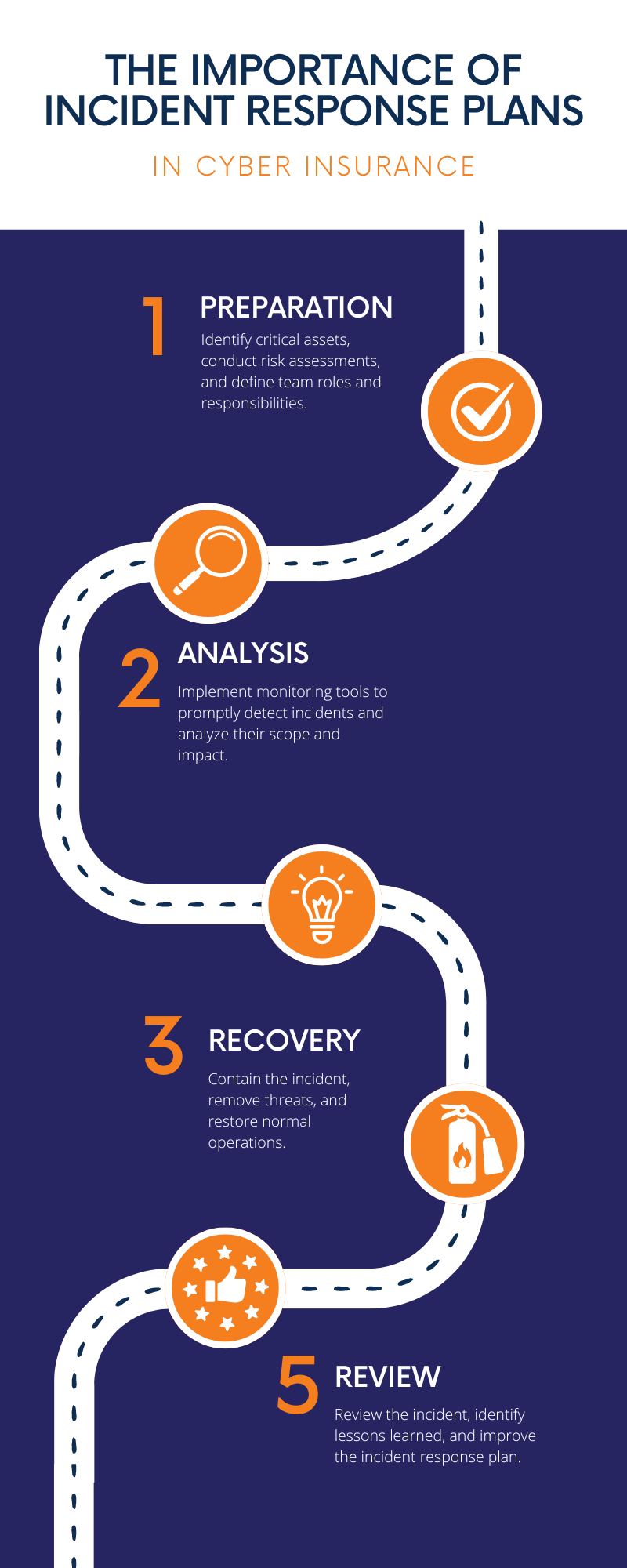Small businesses in Virginia are prime targets for cybercriminals, yet many owners are unaware of how an incident response plan can be their secret weapon in recovering from these attacks successfully. Beyond mitigating dangers, a well-crafted incident response plan can dramatically impact cyber insurance for small businesses, leading to better rates and coverage.
Today, we unravel the benefits of an incident response plan, from slashing premiums to smoothing out claims, with insights on how local IT support in Virginia can help. Stay with us to learn how to turn potential cyber disasters into manageable, insurable events, protecting both your business and your peace of mind.
Incident Response Plans: What Are They and Why Do Small Businesses in Virginia Need One?
An incident response plan is a documented, structured approach detailing how your business is going to address and manage a cyber incident. This plan aims to handle the situation in a way that limits damage, reduces recovery time, and mitigates financial and reputational loss. For SMBs in particular, having an incident response plan is essential for several reasons:
- Increased Vulnerability: Small businesses often lack the extensive cybersecurity resources that larger companies possess, making them prime targets for cybercriminals—even if they don’t always see things that way.
- Perceived Immunity: Only 37% of US SMB owners are worried that their businesses will be on the receiving end of a cyber-attack in the next year, despite almost 3 in 4 experiencing an attempt in 2022.
- Compliance Requirements: Various regulations, including Virginia’s Data Protection Act, mandate businesses to protect personal information and promptly report data breaches.
- Business Continuity: An effective incident response plan ensures that business operations can resume quickly after an attack, minimizing your downtime and financial loss.
How Does an Incident Response Plan Affect Cyber Insurance for Small Businesses?
A comprehensive incident response plan (or ‘IRP’) has a two-fold impact on cyber insurance outcomes.
Impact on Premiums
Having an IRP can positively impact the initial cost of cyber insurance coverage for SMBs. Insurers consider a business’s risk management practices when determining their premiums. A well-defined IRP demonstrates that you’re prepared to handle cyber threats, which can lower the perceived risk and, consequently, the breadth of coverage and rates you’re offered—great news for your budget.
Impact on Claims
When a cyber incident occurs, an IRP plays a vital role in the claims process. A well-executed response can:
- Speed Up Recovery: Faster containment and resolution of the event can reduce the extent of the damage and associated repair and recovery costs.
- Provide Documentation: Detailed logs and reports generated during the incident response process can provide evidence to support any insurance claims, making the process smoother.
- Mitigate Losses: By effectively managing the incident, you keep financial losses minimal, which in turn can lead to more favorable claim evaluations by the insurer.
For a more in-depth look at cyber insurance for small businesses, give our previous blog on 5 Common Cyber Insurance Pitfalls and How to Avoid Them a read.
What Makes a Good Incident Response Plan?
Anyone can throw together a haphazard IRP, but it’s not going to hold up under cyber insurers’ scrutiny (let alone the real event). A quality IRP should be comprehensive and include the following components:
- Preparation: Identify critical assets, conduct risk assessments, and define your team’s roles and responsibilities.
- Detection and Analysis: Implement monitoring tools to detect incidents promptly and analyze their scope and impact.
- Containment, Eradication, and Recovery: Develop strategies to contain the incident, remove the threat, and restore normal operations.
- Post-Incident Activities: Conduct a post-incident review to identify lessons learned and improve the IRP.

Effective Incident Response Plans in Action
While specific examples of small businesses with effective IRPs are less widely published, there are notable cases of larger organizations demonstrating best practices than any SMB can learn from:
Target: After a major data breach in 2013, Target enhanced its incident response capabilities, including better detection and quicker response times. This has helped them manage subsequent threats more effectively.
Equifax: Following their 2017 breach, Equifax implemented a more robust IRP, focusing on immediate containment and long-term security improvements.
But what might a successful IRP look like a little closer to home? Let’s explore some hypotheticals…
- A Retailer: Let’s say an employee at a local retailer opens the store one morning and tries to log on to their CRM. But there’s a message on their laptop screen demanding payment, and no conceivable way for them to recoup their valuable customer data without paying up—they’ve been targeted by a ransomware attack.
Their IRP includes isolating the infected systems and disconnecting their laptop from the network so the ransomware can’t spread. They then notify their IT support team in Virginia and let their customers know about the potential data exposure.
This swift action means the IT team can ensure access to the compromised systems is disabled, preventing further downtime. Thanks to speedy and clear communications, the retailer also maintains customer trust, positively impacting this small business’s cyber insurance claim.
- A Healthcare Business: Imagine a worker at a healthcare clinic receives a convincing email from one of their IT team, requesting they reset their password. The employee complies, only to realize that it’s not their IT department at all, but a phishing scammer who’s now trying to use their credentials to access patient records.
The clinic’s incident response plan involves immediate system lockdown, with all access permissions revoked and administrative password changed. They notify patients and collaborate with local cybersecurity experts to enhance security measures.
This response helps avoid regulatory penalties and ensures patient data protection, influencing favorable insurance evaluations.
- A Government Contractor: Thanks to their advanced threat detection tools, a Virginia-based government contractor could spot a cyber espionage attempt before any confidential information gets compromised.
Their IRP includes notifying relevant federal authorities, like the FBI or Department of Homeland Security, about the attempt, collaborating with reputable IT support to conduct a comprehensive forensic analysis of the breach, and implementing additional security protocols such as regular security audits and penetration testing to identify and fix future vulnerabilities.
This comprehensive approach helps mitigate national security risks and supports a robust insurance claim.
IT Support in Virginia: A Crucial Ally
IT support in Virginia plays a vital role in helping small businesses formulate and test their incident response plans. Local IT teams provide the necessary technical expertise to develop, implement, and refine IRPs, ensuring your business is well-prepared to handle cyber threats. Regular testing and updates to the IRP, facilitated by IT support, ensure that the plan remains effective against evolving cyber risks.
Implement An Incident Response Plan Today
The take-home message for SMBs is clear: investing time and resources into developing and maintaining a strong incident response plan is more than a protective measure—it’s also a strategic advantage in securing comprehensive and cost-effective cyber insurance coverage. As cyber threats continue to evolve, so too must the strategies to counter them, making IRPs an indispensable part of any small business’s defense arsenal.
Infinity Technologies: Virginia’s Premier Managed IT, Cybersecurity, and IT Support Partners in Charlottesville, Fredericksburg, and Richmond
At Infinity Technologies, we specialize in providing IT and cybersecurity solutions that cover all bases—from initial assessment to ongoing threat management, response, and recovery—to SMBs in Charlottesville, VA, and beyond. Our services are designed to keep your business safe, secure, and operational, no matter the cyber threats you face.
Curious to see the difference that we can make for your SMB? Contact us today to learn how our IT support and cybersecurity solutions and managed services can provide the robust protection your business deserves.



